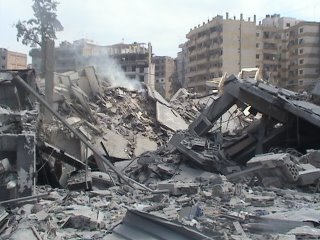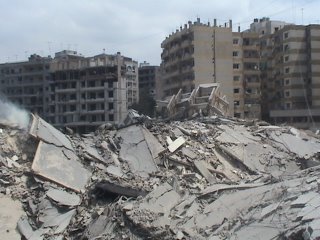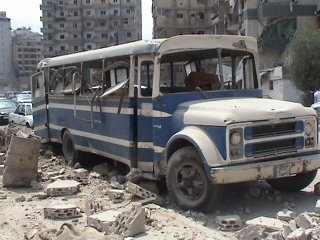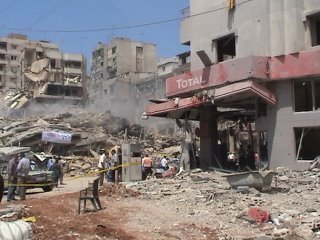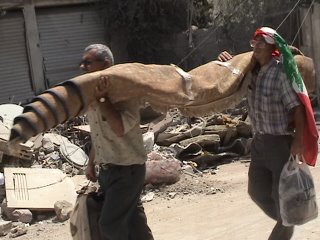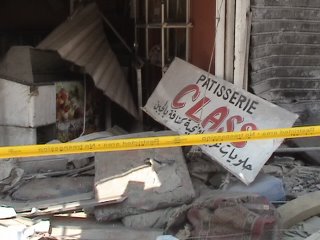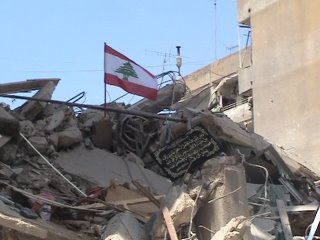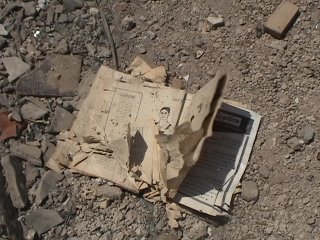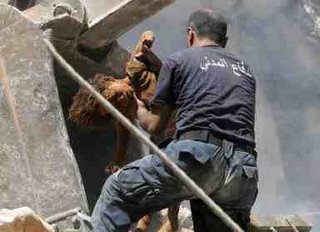Published on Saturday, August 5, 2006 by Foreign Policy In Focus
http://www.fpif.org/fpiftxt/3412
The Bush administration and an overwhelming bipartisan majority of Congress have gone on record defending Israel's assault on Lebanon's civilian infrastructure as a means of attacking Hezbollah “terrorists.” Unlike the major Palestinian Islamist groups, Hamas and Islamic Jihad, Hezbollah forces haven't killed any Israeli civilians for more than a decade. Indeed, a 2002 Congressional Research Service report noted, in its analysis of Hezbollah, that “no major terrorist attacks have been attributed to it since 1994.” The most recent State Department report on international terrorism also fails to note any acts of terrorism by Hezbollah since that time except for unsubstantiated claims that a Hezbollah member was a participant in a June 1996 attack on the U.S. Air Force dormitory at Khobar Towers in Saudi Arabia.
While Hezbollah's ongoing rocket attacks on civilian targets in Israel are indeed illegitimate and can certainly be considered acts of terrorism, it is important to note that such attacks were launched only after the U.S.-backed Israeli assault on civilian targets in Israel began July 12. Similarly, Hezbollah has pledged to cease such attacks once Israel stops its attacks against Lebanon and withdraws its troops from Lebanese territory occupied since the onset of the latest round of hostilities. (The Hezbollah attack on the Israeli border post that prompted the Israeli assaults, while clearly illegitimate and provocative, can not legally be considered a terrorist attack since the targets were military rather than civilian.)
Indeed, the evolution of this Lebanese Shiite movement from a terrorist group to a legal political party had been one of the more interesting and hopeful developments in the Middle East in recent years. Like many radical Islamist parties elsewhere, Hezbollah (meaning “Party of God”) combines populist rhetoric, important social service networks for the needy, and a decidedly reactionary and chauvinistic interpretation of Islam in its approach to contemporary social and political issues. In Lebanese parliamentary elections earlier last year, Hezbollah ended up with fourteen seats outright in the 128-member national assembly, and a slate shared with the more moderate Shiite party Amal gained an additional twenty-three seats. Hezbollah controls one ministry in the 24-member cabinet. While failing to disarm as required under UN Security Council resolution 1559, Hezbollah was negotiating with the Lebanese government and other interested Lebanese parties, leading to hopes that the party's military wing would be disbanded within a few months. Prior to calling up reserves following the Israeli assault, Hezbollah could probably count on no more than a thousand active-duty militiamen.
In other words, whatever one might think of Hezbollah's reactionary ideology and its sordid history, the group did not constitute such a serious threat to Israel's security as to legitimate a pre-emptive war.
Having ousted Syrian forces from Lebanon in an impressive nonviolent uprising last year, the Lebanese had re-established what may perhaps be the most democratic state in the Arab world. Because they allowed the anti-Israel and anti-American Hezbollah to participate in the elections, however, the Israeli government and the Bush administration—with strong bipartisan support on Capitol Hill—apparently decided that Lebanon as a whole must be punished in the name of “the war on terror.”
Inverse Reaction to Threat
Just as Washington's concerns about the threat from Iraq grew in inverse correlation to its military capability—culminating in the 2003 invasion long after that country had disarmed and dismantled its chemical, biological, and nuclear weapons programs—the U.S. focus on Hezbollah has grown as that party had largely put its terrorist past behind it. In recent years, the administration and Congress—in apparent anticipation of the long-planned Israeli assault—began to become more and more obsessed with Hezbollah. For example, not a single Congressional resolution mentioned Hezbollah during the 1980s when they were kidnapping and murdering American citizens and engaging in other terrorist activities. In fact, no Congressional resolution mentioned Hezbollah by name until 1998, years after the group's last act of terrorism noted by the State Department. During the last session of Congress, there were more than two dozen resolutions condemning Hezbollah.
In March of last year, the U.S. House of Representatives passed a resolution by an overwhelming 380-3 margin condemning “the continuous terrorist attacks perpetrated by Hezbollah.” Despite contacting scores of Congressional offices asking them to cite any examples of terrorist attacks by Hezbollah at any time during the past decade, no one on Capitol Hill with whom I have communicated has been able to cite any.
Adding to the hyperbole is the assertion that Hezbollah threatens not just Israel but the United States, despite never having attacked or threatened to attack U.S. interests outside of Lebanon. Cited as evidence in the nearly unanimous March 2005 House resolution is testimony from former CIA director George Tenet (who also insisted that the case for Iraq having offensive weapons of mass destruction was a “slam dunk”), in which he made the bizarre accusations that Hezbollah is “an organization with the capability and worldwide presence [equal to] al-Qaida, equal if not far more [of a] capable organization … [t]hey're a notch above in many respects … which puts them in a state sponsored category with a potential for lethality that's quite great.”
In reality, other than a number of assassinations of political opponents in Europe during the 1980s and 1990s, it is highly debatable whether Hezbollah has ever launched a terrorist attack outside of Lebanon. The United States alleges as one of its stronger cases that Hezbollah was involved in two major bombings of Jewish targets in Argentina: the Israeli embassy in 1993 and a Jewish community center in 1994, both resulting in scores of fatalities. Despite longstanding investigations by Argentine officials, including testimony by hundreds of eyewitnesses and two lengthy trials, no convincing evidence emerged that implicated Hezbollah. The more likely suspects are extreme right-wing elements of the Argentine military, which has a notorious history of anti-Semitism.
Not every country has failed to recognize Hezbollah's evolution from its notorious earlier years. The European Union, for example, does not include Hezbollah among its list of terrorist groups. As a result, in yet another effort to push the U.S. foreign policy agenda on other nations, last year's House resolution also “urges the European Union to classify Hezbollah as a terrorist organization.” This may be the first and only time the U.S. Congress has sought to directly challenge EU policy on a non-trade issue.
The Europeans have had far more experience with terrorism, are much closer geographically to the Middle East, and historically have had stronger commercial, political, and other ties to Lebanon than the United States and are therefore at least as capable as the U.S. Congress of assessing the orientation of Hezbollah. Furthermore, the European Union has had no problem labeling al-Qaida, Islamic Jihad, or Hamas as terrorist organizations, which suggests that it would have extended the same designation to Hezbollah if the facts warranted it. Both Republican and Democratic House members, however, most of whom have little knowledge of the complexities of contemporary Lebanese politics and apparently fearing European criticism of a U.S.-backed Israeli attack on Lebanon, arrogantly insisted they knew better and that they had the right to tell the European Union what to do.
The Rise of Hezbollah
Hezbollah did not exist until four years after Israel first invaded and occupied southern Lebanon in 1978. The movement grew dramatically following Israel's more extensive U.S.-backed invasion and occupation of the central part of the country in 1982 and the subsequent intervention by U.S. Marines to prop up a weak Israeli-installed government. In forcing the departure of the armed forces of the Palestine Liberation Organization and destroying the broad, left-leaning, secular Lebanese National Movement, the U.S. and Israeli interventions created a vacuum in which sectarian groups like Hezbollah could grow.
During the early 1990s, following the end of the Lebanese civil war, a revived central Lebanese government and its Syrian backers disarmed most of the other militias that had once carved up much of the country. By contrast, as the Israeli attacks continued, Hezbollah not only remained intact, it grew. Years of heavy Israeli bombardment led hundreds of thousands of Lebanese Shiites to flee north, filling vast slums in the southern outskirts of Beirut. From these refugees and others who suffered as a result of these U.S.-supported Israeli assaults Hezbollah received the core of its support. The Hezbollah militia became heroes to many Lebanese, particularly as the U.S.-led peace process stalled.
The Hezbollah also periodically fired shells into Israel proper, some of which killed and injured civilians. Virtually all these attacks, however, were in direct retaliation for large-scale Israeli attacks against Lebanese civilians. The United States condemned Hezbollah not just for occasional attacks inside Israel but also for its armed resistance against Israeli soldiers within Lebanon, despite the fact that international law specifically recognizes the right of armed resistance against foreign occupation forces. The United States was apparently hoping that enough Israeli pressure against Lebanon would force the Lebanese to sign a separate peace treaty with Israel and thereby isolate the Syrians. U.S. officials greatly exaggerated the role of Syria in its control and support for Hezbollah, seemingly ignoring the fact that Syria had historically backed Amal, a rival Shiite militia. By contrast, while the radical Iranian Revolutionary Guards did play a significant role in the initial formation of Hezbollah in 1982, most direct Iranian support diminished substantially in subsequent years. The emphasis by the United States in subsequent years on Hezbollah's ties to Iran has largely been to discredit a movement that had widespread popular support across Lebanon's diverse confessional and ideological communities.
By the mid-1990s, greater casualties among Israeli Defense Forces (IDF) in occupied southern Lebanon led to increased dissent within Israel. In response to public opinion polls showing that the vast majority of Israelis wanted the IDF to withdraw unilaterally, Martin Indyk—President Clinton's ambassador to Israel who had also served as his assistant secretary of state for the Middle East—publicly encouraged Israel to keep its occupation forces in Lebanon. In other words, the United States, while defending its sanctions and bombing against Iraq on the grounds of upholding UN Security Council resolutions, was encouraging Israel—against the better judgment of the majority of its citizens—to defy longstanding UN Security Council resolutions demanding Israel's unconditional withdrawal. In an interesting display of double standards, the wording of the 1978 resolution demanding Israel's withdrawal from Lebanon was virtually identical to the resolution passed twelve years later demanding Iraq's withdrawal from Kuwait, for which the United States went to war.
The Hezbollah militia finally drove the Israelis and their proxy force out of Lebanon in a hasty retreat in May 2000. In the wake of the failure of those advocating a more moderate ideology and a diplomatic solution, the military victory by Hezbollah greatly enhanced its status.
For more than a dozen years, the Hezbollah militia had restricted its armed activities to fighting Israeli occupation forces, initially in southern Lebanon and—following Israel's withdrawal in 2000—in a disputed border region with Syria still under Israeli military occupation. Both the Bush administration and Congress, however, have sought to blur the distinction between armed resistance against foreign occupation forces, which is generally recognized under international law as legitimate self-defense, and terrorism, which—regardless of the political circumstances—is always illegal, since it targets innocent civilians. (Few Americans, for example, would have labeled the sporadic attacks by Kuwaiti resistance fighters against Iraqi occupation forces during the six months Saddam's army occupied their country in 1990-91 as acts of terrorism. By contrast, had the Kuwaiti resistance planted bombs on buses or in cafes in Baghdad or Basra, the terrorist label would have been quite deserved, however illegitimate Iraq's invasion and occupation of Kuwait may have been. The same holds true for apologists for Palestinian terrorism who attempt to justify the murders of innocent Israeli civilians on the grounds that it is part of the armed struggle against the Israeli occupation of the West Bank and Gaza Strip.)
Despite some unconfirmed reports linking individual Hezbollah operatives with Palestinian terrorist groups, it appears that the movement as a whole had become another one of the scores of former terrorist groups and political movements with terrorist components that have evolved into legitimate political parties in recent decades. These include the current ruling parties or ruling coalition partners of the governments of Israel, Algeria, Uruguay, Zimbabwe, and Afghanistan. Indeed, some prominent leaders of the U.S.-backed Islamic coalition in Iraq were once part of organizations labeled terrorist by the U.S. State Department and a few have even maintained longstanding ties with Hezbollah.
Rather than welcoming Hezbollah's important shift away from the use of terrorism to advance its political agenda, however, the Bush administration and Congress—in apparent anticipation of a U.S.-Israeli assault against the group and its supporters—instead became increasingly alarmist about the supposed threat posed by this Lebanese political party. And, given the refusal by the Lebanese government to ban the political party and their inability to disband the militia, the United States has given Israel the green light to attack not just Hezbollah militia, but the civilian infrastructure of Lebanon as well.
Why Hezbollah?
Given the number of dangerous movements in the Middle East and elsewhere that really have been involved in ongoing terrorist activities in recent years, why this obsession over a minority Lebanese party that had, prior to last month's assault by Israel, largely left terrorism behind?
A key component of the Bush Doctrine holds that states supporting groups that the U.S. government designates as “terrorist” are as guilty as the terrorists themselves and are therefore legitimate targets for the United States to attack in the name of self-defense.
This doctrine applies not just to Lebanon, but to Syria and Iran as well, the two countries that the neoconservative architects of the U.S. invasion of Iraq have proposed as the next targets for attack. Though outside support for Hezbollah has declined dramatically from previous years, Syria and Iran have traditionally been Hezbollah's primary backers. By formally designating Hezbollah as a “terrorist organization” and exaggerating the degree of Syrian and Iranian support, the Bush administration and Congress are paving the way for possible U.S. military action against one or both countries some time in the future. Just as Soviet and Cuban control over leftist movements and governments in Central America and Africa during the 1980s was grossly exaggerated in order to advance the Reagan administration's global agenda, a similar, bipartisan effort is afoot to exaggerate Syrian and Iranian control over Hezbollah.
During the Cold War, nationalist movements that coalesced under a Marxist-Leninist framework, such as the National Liberation Front in South Vietnam, were depicted not as the manifestation of a longstanding national liberation struggle against foreign domination, but part of the global expansionist agenda of international communism. As such, sending more than a half a million American troops into South Vietnam and engaging in the heaviest bombing campaign in world history was depicted as an act of self-defense for “if we do not fight them over there, we will have to fight them here.” Once American forces withdrew, however, Vietnamese stopped killing Americans. Similarly, Hezbollah stopped attacking French and American interests when they withdrew from Lebanon in 1984. As noted above, they largely stopped attacking Israelis when they withdrew from Lebanon in 2000 (with the exception of the Shebaa Farms, which they claim is part of Lebanon).
Therefore, a second reason for the U.S. government's disproportionate hostility toward Hezbollah may be to convince Americans that radical Islamist groups with a nationalist base will not stop attacking even after troop withdrawal. The Bush administration has insisted that the United States must destroy the terrorists in Iraq or they will attack the United States. But the rise of Islamic extremist groups and terrorist attacks in Iraq came only after the United States invaded that country in 2003. And if Americans recognized that attacks against Americans by Iraqis would stop if U.S. forces withdrew, it would be harder to justify the ongoing U.S. war. Similarly, if Americans recognized that terrorist attacks by Hamas and Islamic Jihad would likely cease if Israel fully withdrew its occupation forces from the West Bank (including East Jerusalem) and Gaza Strip and allowed for the emergence of a viable independent Palestinian state, they would no longer be able to defend their financial, military, and diplomatic support for the ongoing occupation, repression, and colonization of those occupied Palestinian territories by the right-wing Israeli government. (As with Hezbollah, Hamas and Islamic Jihad did not come into existence until after years of Israeli occupation and the failure of both secular nationalist groups and international diplomacy to end the occupation.)
This, of course, is not what the Bush administration or Congressional leaders want people to think, however, since it would make it far more difficult to defend the wars in Iraq, Palestine, and Lebanon. Therefore, it is politically important to convince Americans that Hezbollah is a terrorist group engaged in “continuous terrorist attacks” that constitute an ongoing threat to the national security interests of the United States and its allies.
The tragedy is how easily the mainstream media and the American public are willing to believe these simplistic misinterpretations of the complex Lebanese political situation, and how easily the war on terrorism can be manipulated to justify a U.S.-backed offensive against a small democratic country's civilian infrastructure.
Stephen Zunes is Middle East editor for the Foreign Policy In Focus Project. He is a professor of Politics and the author of Tinderbox: U.S. Middle East Policy and the Roots of Terrorism (Common Courage Press, 2003).
© 2006 Foreign Policy in Focus

